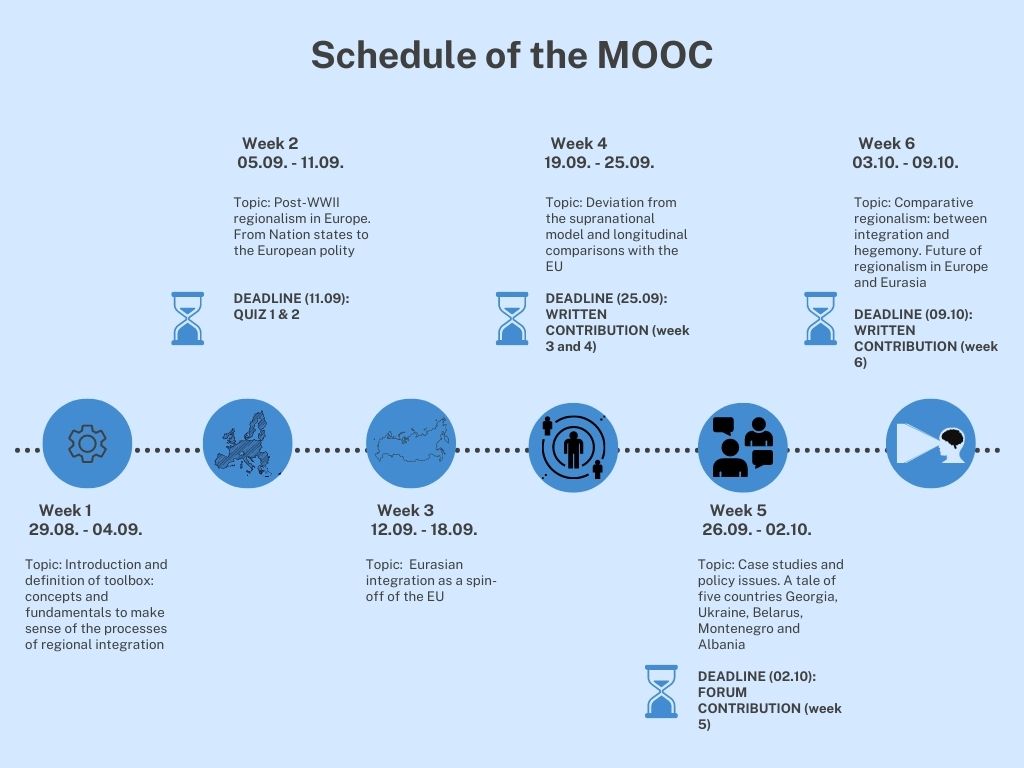Enrol in a MOOC “Common Challenges of Competing Regionalisms” offered by NearEU Module
Are you interested to widen your knowledge about comparative regionalism and integration processes in Europe and Eurasia? Would you like to know more about the dimensions of comparative regionalism in the European and Eurasian context in the light of emergence, transformation, and consolidation of integration processes in the EU and in the former Soviet space?
Join our e-course “Common Challenges of Competing Regionalisms” launched by the Johan Skytte Institute of Political Studies (University of Tartu) and meet our lecturers in the virtual classroom! The MOOC is worth 2 ECTS and runs from 29.08.2022 – 09.10.2022.
Register here (by 25.08, 2022)
What will you learn during the course?
During the course you are going to learn about:
- The multifaceted nature of regionalism in different geo-territorial and geo-political contexts in Europe and Eurasia;
- Conceptual and theoretical definition of regionalism by looking at the relevant cleavages in contemporary societies;
- Post-WWII regionalism in Europe
- Eurasian integration as a spin-off of the EU;
- Deviation from the supranational model and longitudinal comparisons with the EU;
- Case studies and policy issues (particularly focusing on the case of Albania; Montenegro, Belarus, Ukraine and Georgia);
- Comparative regionalism: between integration and hegemon;
Why should you take this course?
By enrolling in the course, you will have access to video lectures from academicians and practitioners, specializing in regional studies. There will also be academic commentary and round-table discussions from academic representatives from the region (such as Ukraine, Georgia, Finland, Albania, Montenegro) aimed at providing specific perspectives on different case studies in understanding the context of competing projects of regional integration (i.e., the EU and Eurasian Economic Union). The participants will also be able to benefit from a wide variety of readings, course supporting and interactive materials as well as a vibrant and international online community of peers with whom they can learn together and interact throughout the course. Moreover, the MOOC has been select as best e-course of the year in Estonia in 2022 by Estonia’s Quality Agency for Higher and Vocational Education (Eesti Kõrg- ja Kutsehariduse Kvaliteediagentuur – EKKA), which confirms that the course meets all quality assurance standards and also includes a number of interactive and student-directed learning features that determined a high level of participants’ involvement and activism.
Upon successful completion of the MOOC, the participants will also receive a free digital certificate from the University of Tartu.
Do you need any prior knowledge?
Basic knowledge of the process of European integration and EU terminology is suggested. In addition, participants should have at least basic web communication skills and basic familiarity of using digital tools for information searching and learning. Participants should be able to work independently; and be able to work and contribute to a discussion in a multicultural online environment.
Course schedule and deadlines:
The course takes place fully online, on the learning management system of the University of Tartu – Moodle. Please note that all video lectures of the course are pre-recorded. Participants can watch the videos on the course page at the time of their convenience, provided they can meet course deadlines.

For additional information: please contact Anna Beitane, anna.beitane@ut.ee
The course is developed within the framework of the Jean Monnet Module ‘Neighbourhood, Enlargement, and Regionalism in Europe’ (NearEU) with the support of the Erasmus+ Programme of the European Union.



